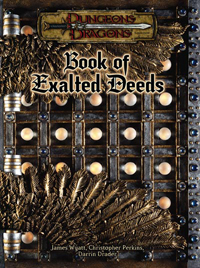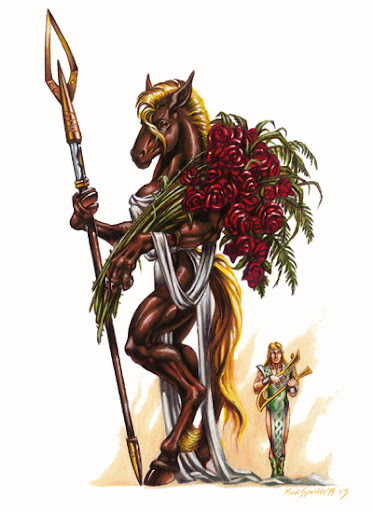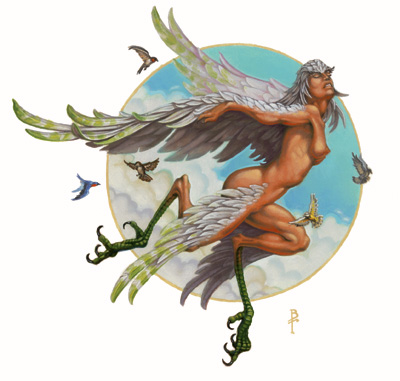
The Book of Exalted Deeds was mostly written by people who wanted to write it. Which is to say that this is James Wyatt's baby, with writing credits also to Chris Perkins and Darrin Drader. James Wyatt is of course a recovering Minister, so the idea of writing a book ranting about Ultimate Good probably appealed to him. Design contribution comes from Jesse Decker and Erik Mona. Erik Mona was at that time a Dragon Magazine guy who got such an erection from the Book of Vile Darkness that he put shout-outs to that book in every magazine he could. So it's no surprise to see him working on the next book in the series. Playtesting credits include such lights as Amy Wyatt (James Wyatt's wife), and Gwendolyn Kestrel (the primary author of the Book of Erotic Fantasy). Make of that what you will.
It's important to note that while the book's predecessor was a surprise hit, the Book of Exalted Deeds was not. There were other books in the AD&D treasure lists, but after the cool reception of the BoED the Spell Compendium wasn't named The Book of Infinite Spells and the Tome of Battle wasn't called The Manual of Puissant Skill at Arms. Some of this is simply that sentence by sentence and paragraph by paragraph, Monte Cook (the main credited author of the Book of Vile Darkness) is a much more engrossing writer than James Wyatt is. But as we'll see later in this review, much of the blame can be laid at the feet of terrible design and development choices. The book has 8 chapters, so we'll try to get a good liver full of booze four times and review the chapters two at a time.
The introduction is by James Wyatt. He tries his hand at poetic contrast, and it is a weak and shaky hand. Wyatt attempts to make the case for this book, and it is meandering and contradictory. He admits early on that the format is basically just the Book of Vile Darkness with all the stuff inverted. That is not a good thing for a book of "Good" to be. Because in any moral system worth anything to anyone, Good isn't merely the opposite of Evil. He also states that the fundamental inversion is that this book is mainly for players to powergame with while the Book of Vile Darkness was mainly for DMs to craft villains. This doesn't ingratiate the book to anyone. Players want powercreep in their sourcebooks, but they don't want the book to say it is about "the power that they gain", because that kind of terminology makes DMs less likely to let you use the book in the first place. The intro then spends more than half its own length trying to explain why the book gets a "Mature Readers" sticker on it, and the bumbling explanation doesn't make any sense. It says it's going to address the issue of whether you can kill baby Orcs (spoiler alert: despite the fact that this question is incredibly easy to answer and extremely fundamental to all alignment internet arguments ever, the book does not in fact give do this), and wrestle with "tough questions", but that doesn't really sound like a reason for something to have an Adults Only sticker on it. Frankly, it's hard to walk away from the explanation of why it has the sticker without the feeling that it has one simply because the Book of Vile Darkness did.
Chapter 1: The Nature of Good
The book is off to a reasonably decent start, in that the first sentences come right out and say that not sinning doesn't make you Good. Fair enough. That is what the Neutral alignments are for. It even points out that good people don't have to be prudish, polite, or naive. Again, fair enough. But then it just sort of goes off into crazy town by telling us that actually Good is "awesome holy energy that radiates from the celestial planes and crushes evil". Uh... gee... thanks. That clears everything up.
See the problem here is that this is written from a Christian perspective. And Christian morality doesn't really make any fucking sense. When you attempt to transfer it to a secular context, you're still stuck at the thing where you're claiming that "goodness" is doing whatever you are told to do by a guy who had his own son murdered in order to convince himself to forgive you for an insult that a distant ancestor of yours gave him when she was young and didn't know any better. That doesn't make sense in a secular context. Fuck, that doesn't make sense in any context. And so rather than trying to base the moral argument on their actual moral system (which is "because I said so"), they go right for the metaphor: the holy radiance of "because I said so".
However, the whole thing where your laser beams are gold instead of red is basically a children's cartoon way of looking at the world. It has no place in any actual discussion of Virtue that a mature adult might want to have. You might stake a claim that Good is about progress, or happiness, or health, or freedom, or courage, or stability or any of a thousand other things that people have ascribed to "the Good". Heck, you could do a thing where you talk about different philosophical schools and their take on what Goodness really means. But when it comes time for Wyatt to use some adjectives to describe good, he just rattles off some tautologies like "benevolent" (which literally means that it "does good") and "righteous" (which literally means that "is good"). The only thing in this entire section that sheds any light (other than indescribable holy light) on the discussion at hand is the use of the word "Just". And justice is an actual thing that you could reasonably consider "good" that isn't merely a tautological restatement of the word "good". So um, good?
Then we start on their subject of "Exalted Deeds", which are apparently the concrete things you can actually do to show that you are Good. They are: helping others, charity, healing, personal sacrifice, worshiping good deities, casting good spells, mercy, forgiveness, bringing hope, and redeeming evil. I'm not even sure the author understands how many of those things boil down to "wear a white hat instead of a black hat". We know we're good because we worship the gods of our side, who are good because they are on our side and our side is good because... aaargh! You could say exactly the same thing about Hextor and the evil societies that worship him. We aren't going to have time to go into all this horseshit, but I think it's important to note the following:
These are separated by two whole lines of text. Need I remind you that D&D has dragons and demons that actually are a dozen levels above you that are totally out of your league? That fighting such monsters would be as futile as it would be stupid? That telling frightened villagers that you can't help them is literally the kindest and truest thing you can say? What the fucking fuck?! The sheer lack of awareness of this statement on Good characters in a D&D context is awe inspiring.Book of Exalted Deeds wrote:good characters aren't necessarily stupid. A good character can be cautious
...
she should never say, "Sorry, I'm out of my league. Go find another hero."
Mercy is another troublesome one. The first sections only meaningful elucidation on what the fuck Good was supposed to mean was to say that it was just. Being just and being merciful are not the same thing. Indeed, they are in many ways opposite things. The mercy section admonishes the good characters to not "fall into the trap" of treating foes "as they have treated others". What the shitfuck? That's what Justice is. Treating people as they have treated others, that's the most Just thing you could possibly do. It might not be the best idea (toothless and blind and all that), but it's certainly Just. The section betrays no awareness whatever that it has admonished you to turn your back on justice in order to have more of a quality that is described almost exclusively as being just. That is some serious Yoda shit, and the fundamental contradiction isn't discussed in the slightest. It's like the people giving us a rant about morality have no actual idea what justice and mercy are, why they are important, and what the connotations of them might be. Actually, it's exactly like that.

This is an actual picture from this section. The tag line is, and I am not making this up: "A paladin must choose between destroying evil and honoring love." That is wrong on so many levels. Not the least of which is that honoring love isn't actually on the list of things this book tells us Good is about. The fact that "love" is apparently exemplified by sexy succubi lesbian hookups that are too noisy and passionate for the participants to notice the approach of a dude in clanking plate armor whose head is actually on fire is just icing on the WTF.
Finally, before we move on from this section, I think we need to talk about the author's creeping Christianity and lack of understanding of D&D. The bit on redeeming evil creatures for full value talks about how it helps the redeemed creature because they get to go to the "blessed afterlife" instead of the "eternity of torment and damnation". That is Christianity, and notably: not D&D. In D&D the afterlife in Evil Town is not eternal (souls can and are destroyed), and if you're awesome enough you get to be the one doing the torturing. Which is your reward, because you're evil, and you presumably like torturing people. If you're a mighty champion of villainy, there is no torment and damnation, eternal or otherwise in Dungeons & Dragons. Also, going to the Upper Planes for your afterlife is pretty shitty if you're not fairly awesome. For fuck's sake, Lathander is going to turn you into a blade of grass for the rest of forever if you don't make the cut to become a celestial servitor.
The book has a little bit of boxed text to assure you that "Exalted" is not the same as "Epic". Spoiler alert: Exalted Feats suck monkey balls and no one was going to be confused by that.
The next subchapter is called "The Straight and Narrow". This continues the author's hamfisted attempts to ram Christianity down our throats by naming the section out of Mathew 7:14. I could actually overlook that (it is a commonly used idiom after all, and need not have a specifically Christian context), but the section is full of idiocy. It starts out with a piece on "ends and means" where it gibbers stupidly and makes less sense than the doctrine of Double Effect. Actually, it basically is the doctrine of double effect, but watered down with weasel words until even Aquinas' shitty moral reasoning sounds lucid. This is followed up by a discussion of violence, which is just the theory of "Just War" with some D&D terms painted on the surface like poop thrown at the glass of a monkey's cage. I need a drink. Anyone who is even passively familiar with Christian apologetics can see exactly where the original feces comes from, and the Wyatt treatment does not make it any more wise or compelling.
This is followed up by the section "Law, Chaos, and Good". And now my glass is empty again for some reason. Law and Chaos don't make any sense in D&D, and this book's treatment doesn't make them any less incoherent. I could go on and on about the myriad ways in which this description of Lawful Good and Chaotic Good are internally inconsistent, but that shit ain't news. Law and Chaos were incoherent bullshit in the PHB, and this book simply spends some more time yammering about this crap without actually helping it be less retarded.
This segues into some examples of characters you might want to be. You do not want to be these characters. The first example is a 15th level Rogue/Monk. Apparently, this character is Rob Lightner's. I have absolutely no idea why they thought they needed to take up space with this. There are a series of "good guy" archetypes, and terrible sample characters. Bonus stupid points for having a "redeemed Mind Flayer" despite the fact that it is still a fucking Mind Flayer and... you know what? Fuck it. I'm going to drink a bit and skip to the bit where they give advice on how to play a member of each of the PHB classes as exalted good. That's where they helpfully inform us that an exalted Bard is "attuned to the music of the heavens and the poetry of creation". Because apparently being more good means being more religious.
This is really a profound failure of the Christian mindset of James Wyatt to comprehend D&D's great wheel alignment hokum. This is a game world where "creation" is just as evil as it is good. Where the heavens are filled with as much wickedness as virtue. Where gods are as likely to represent slaughter, oppression, and deceit as to promote health, freedom, or truth. I don't really understand how this could have been missed while putting this book together. As we showed in a recent OSSR, one of the playtesters has an honest to goodness god of rape in her campaign world as a major plot point. So you'd think that someone would had a talking to for Wyatt about how godliness had absolutely fuck all to do with goodliness in D&D. But they didn't. Or maybe they did and he just didn't fucking care. Even the exalted druid is described as hangin with the celestial servants of gods.
Never to let an opportunity to shit Christian claptrap all over a secular game about a multipolar polytheistic society, the Book of Exalted Deeds has a whole crapfest about Sin and Atonement. This is written entirely from a Christian perspective. It announces that you have to repent and atone for your sins before you get divine forgiveness. Ugh.
The chapter rounds up at about four glasses of booze and a diatribe about how the way to really show how "Good" the characters are is make the villains really, really bad. This seems totally insane to me. I mean, everybody hates Hitler. You don't have to be some sort of paragon of virtue to figure out which side you should fight on if your enemies are really, really bad. I mean, even Stalin gets to be on the good guy side if your enemy is vile enough. Characters are not "more good" when their enemies are more evil, their good is "more noticeable" or something. It's just a profound missing of the point of what foils do in a narrative.

Chapter 2: Optional Rules
This chapter is off to a very bad start, because it talks about how the book is going to introduce "exalted topics" and gives the examples of: channeling celestials, voluntary poverty, and nonviolence. Of those, only one of them is specifically about goodness. Voluntary poverty is just a form of dedication. I mean, naked man eating manticores might eschew physical belongings, but I don't think they are exalted amongst the names of the good.
This chapter is broadly speaking a direct rip of chapter 2 of the Book of Vile Darkness. This goes right into the thing where if you take something that is evil and then reverse it, you don't really get "good" with any great reliability. So the book gives you a variant on fiendish possession for great justice, a section on fiendish possession from the perspective of the exorcist, a collection of exalted gods (to go with the equally superfluous "vile gods" from Book of Vile Darkness), and a bit on martyrdom. Martyrdom is really a pretty messed up thing to exalt (see: the Taliban), and this book is on incredibly shaky moral grounds wanking to martyrdom and sainthood.
There is a bit on redeeming prisoners. It describes basically Stockholm Syndrome as the highest ideal, and goes into somewhat creepy detail about it. Not the psychological implications, which are creepy enough, but the actual process.
Basically, I feel like I am reading excerpts from the author's Mary Sue BDSM romance novel. And this is apparently what it means to the author to be "good". It then goes on about how you have to witness for the lord spend an hour describing the benefits of redemption, confessing of the sins confessing of the sins, and speaking of the lord's infinite forgiveness display a willingness to forgive the captive's sins. Only then are you able to get them to get baptized anew. This is literally exactly the Christian missionary playbook, but the book is presenting it as something you do to your prisoners, which is a level of super duper creepiness.BoED wrote:Initially, an evil character might greet this treatment with scorn and look for opportunities to escape. When he finds the good characters gentle but firm, kind but smart in their defense, he gains a new degree of respect for them, gleaning at least a glimmer of an idea that one needn't be cruel to be strong.
Then we get to a bit on how tithing and offerings to the church is the right thing to do and then we jump right into the Vow of Poverty. The Vow of Poverty has received more virtual ink complaining about it than anything else in this book, and really more than most things in most books. And that's reasonable, because it's really really bad. The short story is that the Vow of Poverty is incredibly bad for the game, as it gives you a bunch of largish bonuses in exchange for not having access to normal equipment because you give all your stuff to charity. But the bonuses you get aren't in any way dependent on how much you give to charity and are the same no matter how equipment dependent your character actually was in the first place. So it's broken if you were a knight because it takes your shining armor away and makes you fight in burlap pants, and it's broken if you generally fight by transforming into a bear or giant snake because you weren't going to be getting any use out of your clothes or equipment anyway. Also there are various shenanigans, where you can get most or all of your bonuses in "non equipment rewards" and you still get the same bonuses even though you literally haven't given up anything at all by giving all of your "zero" pieces of tangible equipment to charity. Fuck.
Then we get a shitty set of guidelines for playing campaigns of non-violent characters in D&D. These don't work at all, because the groundwork for non-violent campaigns isn't there. So the rest of the characters are still slaying dragons and rescuing princesses, and the non-violent character is... being a giant annoying millstone around the neck of everyone else.
The chapter wraps up with "Words of Creation", which are a simple inversion of the evil speech rules from the Book of Vile Darkness. Except given more explicitly religious and Christian overtones because this book still can't tell the difference between "goodly" and "godly". And that's the chapter.
Next up: Chapter 3: Exalted Equipment
-Username17









